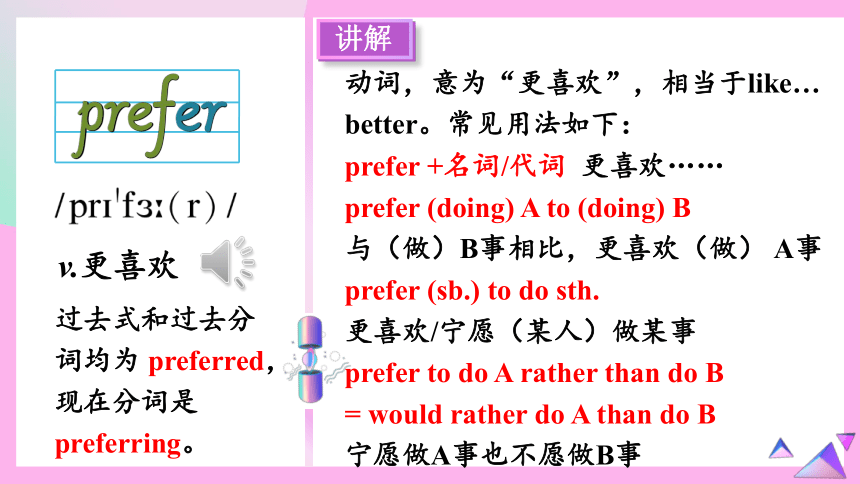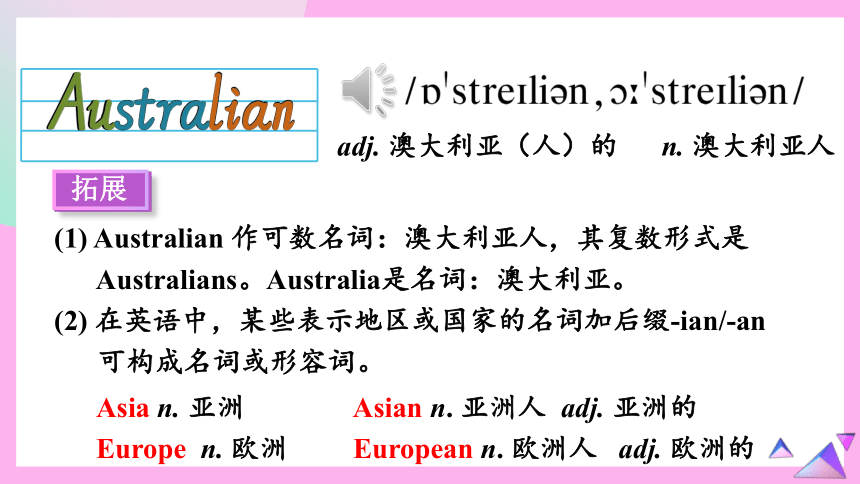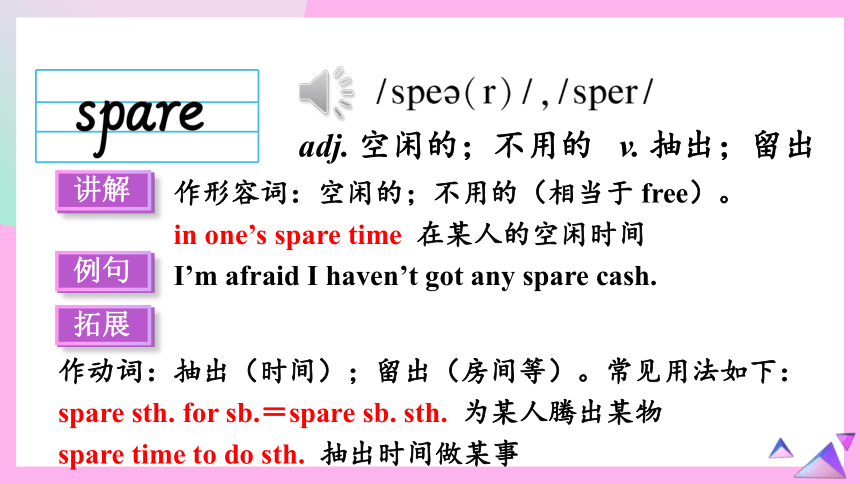Unit 9 I like music that I can dance to. Section A词汇讲解课件(共16张PPT)+内嵌音频
文档属性
| 名称 | Unit 9 I like music that I can dance to. Section A词汇讲解课件(共16张PPT)+内嵌音频 |  | |
| 格式 | zip | ||
| 文件大小 | 13.9MB | ||
| 资源类型 | 教案 | ||
| 版本资源 | 人教新目标(Go for it)版 | ||
| 科目 | 英语 | ||
| 更新时间 | 2021-12-26 20:45:49 | ||
图片预览







文档简介
(共16张PPT)
Unit 9 I like music that I can dance to.
Section A
R·九年级下册
v.更喜欢
讲解
动词,意为“更喜欢”,相当于like… better。常见用法如下:
过去式和过去分词均为 preferred,
现在分词是 preferring。
prefer +名词/代词 更喜欢……
prefer (doing) A to (doing) B
与(做)B事相比,更喜欢(做) A事
prefer (sb.) to do sth.
更喜欢/宁愿(某人)做某事
prefer to do A rather than do B
= would rather do A than do B
宁愿做A事也不愿做B事
adj. 澳大利亚(人)的 n. 澳大利亚人
(1) Australian 作可数名词:澳大利亚人,其复数形式是
Australians。Australia是名词:澳大利亚。
(2) 在英语中,某些表示地区或国家的名词加后缀-ian/-an
可构成名词或形容词。
Asia n. 亚洲 Asian n. 亚洲人 adj. 亚洲的
Europe n. 欧洲 European n. 欧洲人 adj. 欧洲的
拓展
adj. 电子的;电子设备的
常用在名词前作定语。
electricity是名词,意为“电;电能”。
He seldom uses electronic products.
What will our life be like if there is no electricity
讲解
例句
拓展
例句
v. 推断;料想
suppose+that从句
猜测/认为……
I suppose that prices will go up.
当主句为一般现在时,谓语动词是think, believe, suppose等,且主句的主语为第一人称时,宾语从句的否定一般要转移到主句中去,这种现象叫“否定前移”。若将该结构改为反意疑问句,附加问句的主语和谓语应与宾语从句的主语和谓语保持一致;若否定转移到主句上,仍视从句为否定。
I don’t suppose that he is right, is he
讲解
例句
拓展
例句
adj. 悦耳的;平滑的
可在句中作定语或表语。
I’m listening to a piece of smooth music.
smooth的相关词:
smoothly adv. 平滑地;平稳地
smooth adj.平滑的
smoothness n.平滑;光滑
讲解
例句
拓展
adj. 空闲的;不用的 v. 抽出;留出
作形容词:空闲的;不用的(相当于 free)。
in one’s spare time 在某人的空闲时间
I’m afraid I haven’t got any spare cash.
作动词:抽出(时间);留出(房间等)。常见用法如下:
spare sth. for sb.=spare sb. sth. 为某人腾出某物
spare time to do sth. 抽出时间做某事
讲解
例句
拓展
讲解
例句
拓展
n. 导演;部门负责人
由“direct (v. 导演;指导)+后缀 –or ”构成。
He is a director in the company.
(1) direct 作动词,意为“导演;指导;指示”。
(2) 在英语中,许多动词加后缀 –er 或 –or 构成名词,表示该动作的执行者。常见单词如下:
sing 唱歌→singer 歌手 teach 教→teacher 教师
短语
例句
拓展
n. 情况;实情
in that case 既然那样;假使那样的话
If that is the case, we need more staff.
与 case 相关的常用短语如下:
in this case 在这种情况下
in any case 无论如何;不管怎样
in case 以防万一
in case of 如果;假使
in no case 绝不
n. 战争;战争状态
Although he is an actor who does not have much experience, he did an excellent job in the new war film.
例句
v. 粘贴;将……刺入
stick ... into... 把……插入/刺入……
stick to 坚持;固守(其后接名词、代词或动词 –ing 形式作宾语。)
作可数名词:枝条;手杖
You should stick to taking exercise unless you do not care about your health.
He picked up sticks to make a fire.
讲解
短语
例句
拓展
例句
过去式和过去分词均为 stuck
adj. 悲哀;沮丧
作形容词:悲哀;沮丧。常用于连系动词后作表语。
You look down! What’s up
He was down because he missed his train.
讲解
例句
n. 对话;对白 =dialogue
The comedy has plenty of dialog which is very humorous.
例句
pron. 大量;众多
plenty of 大量;充足(其后可接可数名词复数或不可数名词,常用于肯定句中。)=a lot of/lots of
There are plenty of eggs in the fridge.
常见的表示“许多”的单词和短语如下:
many/a number of 只能修饰可数名词复数
much/a great deal of 只能修饰不可数名词
a lot of/lots of/plenty of 既能修饰可数名词复数,
也能修饰不可数名词
短语
例句
拓展
v. 关闭;关上
shut off 关闭;停止运转,是“动词+副词”型短语,通常用于指关闭电器或切断水、煤气等。
The car alarm is ringing. Please shut it off.
动词:关闭;关上。一般指把开着的门、窗等关上,可与 close 换用。
Phillip went into his room and shut the door behind him.
讲解
例句
短语
例句
过去式和过去分词均为 shut,现在分词是 shutting。
讲解
例句
偶尔地;间或
在句中一般作状语,一般放在句首或句末。
Once in a while, they go for a picnic in the park.
We only meet once in a while.
相当于 sometimes 或 at times
Unit 9 I like music that I can dance to.
Section A
R·九年级下册
v.更喜欢
讲解
动词,意为“更喜欢”,相当于like… better。常见用法如下:
过去式和过去分词均为 preferred,
现在分词是 preferring。
prefer +名词/代词 更喜欢……
prefer (doing) A to (doing) B
与(做)B事相比,更喜欢(做) A事
prefer (sb.) to do sth.
更喜欢/宁愿(某人)做某事
prefer to do A rather than do B
= would rather do A than do B
宁愿做A事也不愿做B事
adj. 澳大利亚(人)的 n. 澳大利亚人
(1) Australian 作可数名词:澳大利亚人,其复数形式是
Australians。Australia是名词:澳大利亚。
(2) 在英语中,某些表示地区或国家的名词加后缀-ian/-an
可构成名词或形容词。
Asia n. 亚洲 Asian n. 亚洲人 adj. 亚洲的
Europe n. 欧洲 European n. 欧洲人 adj. 欧洲的
拓展
adj. 电子的;电子设备的
常用在名词前作定语。
electricity是名词,意为“电;电能”。
He seldom uses electronic products.
What will our life be like if there is no electricity
讲解
例句
拓展
例句
v. 推断;料想
suppose+that从句
猜测/认为……
I suppose that prices will go up.
当主句为一般现在时,谓语动词是think, believe, suppose等,且主句的主语为第一人称时,宾语从句的否定一般要转移到主句中去,这种现象叫“否定前移”。若将该结构改为反意疑问句,附加问句的主语和谓语应与宾语从句的主语和谓语保持一致;若否定转移到主句上,仍视从句为否定。
I don’t suppose that he is right, is he
讲解
例句
拓展
例句
adj. 悦耳的;平滑的
可在句中作定语或表语。
I’m listening to a piece of smooth music.
smooth的相关词:
smoothly adv. 平滑地;平稳地
smooth adj.平滑的
smoothness n.平滑;光滑
讲解
例句
拓展
adj. 空闲的;不用的 v. 抽出;留出
作形容词:空闲的;不用的(相当于 free)。
in one’s spare time 在某人的空闲时间
I’m afraid I haven’t got any spare cash.
作动词:抽出(时间);留出(房间等)。常见用法如下:
spare sth. for sb.=spare sb. sth. 为某人腾出某物
spare time to do sth. 抽出时间做某事
讲解
例句
拓展
讲解
例句
拓展
n. 导演;部门负责人
由“direct (v. 导演;指导)+后缀 –or ”构成。
He is a director in the company.
(1) direct 作动词,意为“导演;指导;指示”。
(2) 在英语中,许多动词加后缀 –er 或 –or 构成名词,表示该动作的执行者。常见单词如下:
sing 唱歌→singer 歌手 teach 教→teacher 教师
短语
例句
拓展
n. 情况;实情
in that case 既然那样;假使那样的话
If that is the case, we need more staff.
与 case 相关的常用短语如下:
in this case 在这种情况下
in any case 无论如何;不管怎样
in case 以防万一
in case of 如果;假使
in no case 绝不
n. 战争;战争状态
Although he is an actor who does not have much experience, he did an excellent job in the new war film.
例句
v. 粘贴;将……刺入
stick ... into... 把……插入/刺入……
stick to 坚持;固守(其后接名词、代词或动词 –ing 形式作宾语。)
作可数名词:枝条;手杖
You should stick to taking exercise unless you do not care about your health.
He picked up sticks to make a fire.
讲解
短语
例句
拓展
例句
过去式和过去分词均为 stuck
adj. 悲哀;沮丧
作形容词:悲哀;沮丧。常用于连系动词后作表语。
You look down! What’s up
He was down because he missed his train.
讲解
例句
n. 对话;对白 =dialogue
The comedy has plenty of dialog which is very humorous.
例句
pron. 大量;众多
plenty of 大量;充足(其后可接可数名词复数或不可数名词,常用于肯定句中。)=a lot of/lots of
There are plenty of eggs in the fridge.
常见的表示“许多”的单词和短语如下:
many/a number of 只能修饰可数名词复数
much/a great deal of 只能修饰不可数名词
a lot of/lots of/plenty of 既能修饰可数名词复数,
也能修饰不可数名词
短语
例句
拓展
v. 关闭;关上
shut off 关闭;停止运转,是“动词+副词”型短语,通常用于指关闭电器或切断水、煤气等。
The car alarm is ringing. Please shut it off.
动词:关闭;关上。一般指把开着的门、窗等关上,可与 close 换用。
Phillip went into his room and shut the door behind him.
讲解
例句
短语
例句
过去式和过去分词均为 shut,现在分词是 shutting。
讲解
例句
偶尔地;间或
在句中一般作状语,一般放在句首或句末。
Once in a while, they go for a picnic in the park.
We only meet once in a while.
相当于 sometimes 或 at times
同课章节目录
- Unit 1 How can we become good learners.
- Section A
- Section B
- Unit 2 I think that mooncakes are delicious!
- Section A
- Section B
- Unit 3 Could you please tell me where the restroom
- Section A
- Section B
- Unit 4 I used to be afraid of the dark.
- Section A
- Section B
- Unit 5 What are the shirts made of?
- Section A
- Section B
- Review of Units 1-5
- Unit 6 When was it invented?
- Section A
- Section B
- Unit 7 Teenagers should be allowed to choose their
- Section A
- Section B
- Unit 8 It must belong to Carla.
- Section A
- Section B
- Unit 9 I like music that I can dance to.
- Section A
- Section B
- Unit 10 You're supposed to shake hands.
- Section A
- Section B
- Review of Units 6-10
- Unit 11 Sad movies make me cry.
- Section A
- Section B
- Unit 12 Life is full of the unexpected
- Section A
- Section B
- Unit 13 We're trying to save the earth!
- Section A
- Section B
- Unit 14 I remember meeting all of you in Grade 7.
- Section A
- Section B
- Review of Units 11-14
